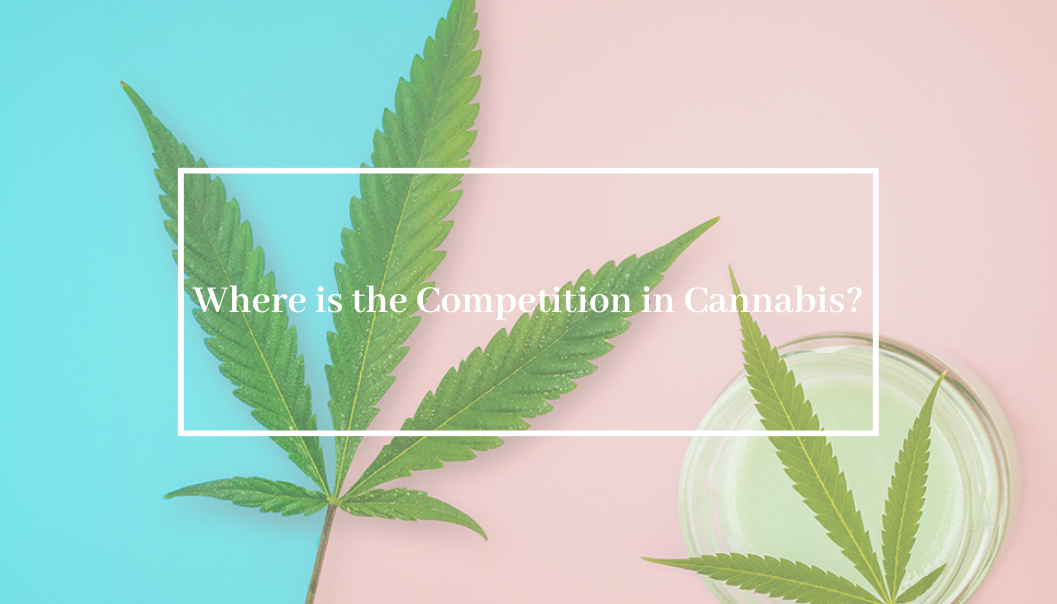
NEWS & PRESS
Where is the Competition in Cannabis?
The cannabis industry is expected to be worth $21.6 billion going into next year, as six more states appear primed for recreational legalization. The fractured regulatory frameworks we’re all trying to keep up with are creating areas of red hot competition as companies race to overcome hurdles. Where are the barriers the highest in this brave new frontier, and how can you come out on top?
Supply chain
Like any agricultural product, there are ebbs and flows in cannabis’s supply and demand. This is made more complicated by the fact that the flower must be sold in the same state it is grown, that users are more loyal to the strains they use than the brands they buy, and that the product has a typical < 1-year shelf life. “Any brand that doesn’t own or have a contract for control of its supply chain is going to have a really hard time. I wouldn’t be surprised if, by the end of 2020, we see 40 percent of the brands that are on the shelf now no longer there.” — Graham Farrar, President, Glass House Farms told Green Entrepreneur. Cannabis dispensary mag offers 10 best practices for supply chain contracts.
Patent Filings
There has been a drastic increase in cannabis-related patent and trademark applications over the past two years. Companies are urged to act quickly to protect their innovations, but patent filings aren’t naturally speedy, added to the fact that you can’t trademark goods or services that are illegal under the Controlled Substances Act. The National Law Review suggests. “While 10 percent of patents issued overall are design patents, less than one percent of cannabis-related filings are designated as design patents. Design patents are quicker and cheaper to obtain; this may be desirable for fast-developing and/or cost-conscious companies and particularly for products having short life cycles. Design patents are particularly valuable for covering the ornamental aspects of well-known cannabis-related products, such as vaporizers, to deter wholesale copying.”
Brand Loyalty
The commercialization of cannabis is still illegal under U.S. federal law, even though it is legal in two-thirds of U.S. states. Products can’t be advertised online, and, because it can’t be transported from state to state, it will take years for a national brand to have the infrastructure to have a cohesive presence across the country. “While some regional brands are starting to emerge, most cannabis consumers have minimal (if zero) brand loyalty today,” Paul Penney, of Northland Capital Markets tells Forbes. “This dynamic will surely evolve over the coming years … but the establishment of well-known/respected brands will take an elongated time to unfold.” Companies looking to build long-term brand relationships locally, and have nuanced and substantive conversations with their customers should lead the way with an experiential marketing program.
Investment
Although there is a lot of excitement and potential in the industry, the cannabis market plummeted in 2019. According to Quartz, the six largest publicly traded cannabis companies lost a collective $25 billion in market value since late March due to new regulations slowing rollouts in California and Canada, “a bloodletting Kevin Murphy, chairman, and CEO of Acreage Holdings, compared to ‘2008 for the cannabis industry.'”
Investors still want to buy into cannabis, but they are less willing to gamble or wait for a return. Companies seeking investment will need to have solid fundamentals, high-quality products, and profitability.
Innovation
Cannabis companies are under huge pressure to innovate. There’s untapped potential in cultivation methods and sustainability, customization, exploration of minor cannabinoids, payment processing, medicine, packaging, and big data, but the sector’s ability to innovate depends on collaboration, which is stymied by state and local regulations, and lack of trust in the industry.
In the end, the fierce competition in the cannabis market will only improve things for the consumer. Brands that were founded because cannabis appeared to be a fun or quick money-maker–those lazily releasing false information about potency within its products, or vape pen ingredients–will perish, making room for true innovators, artisans, and technicians.

